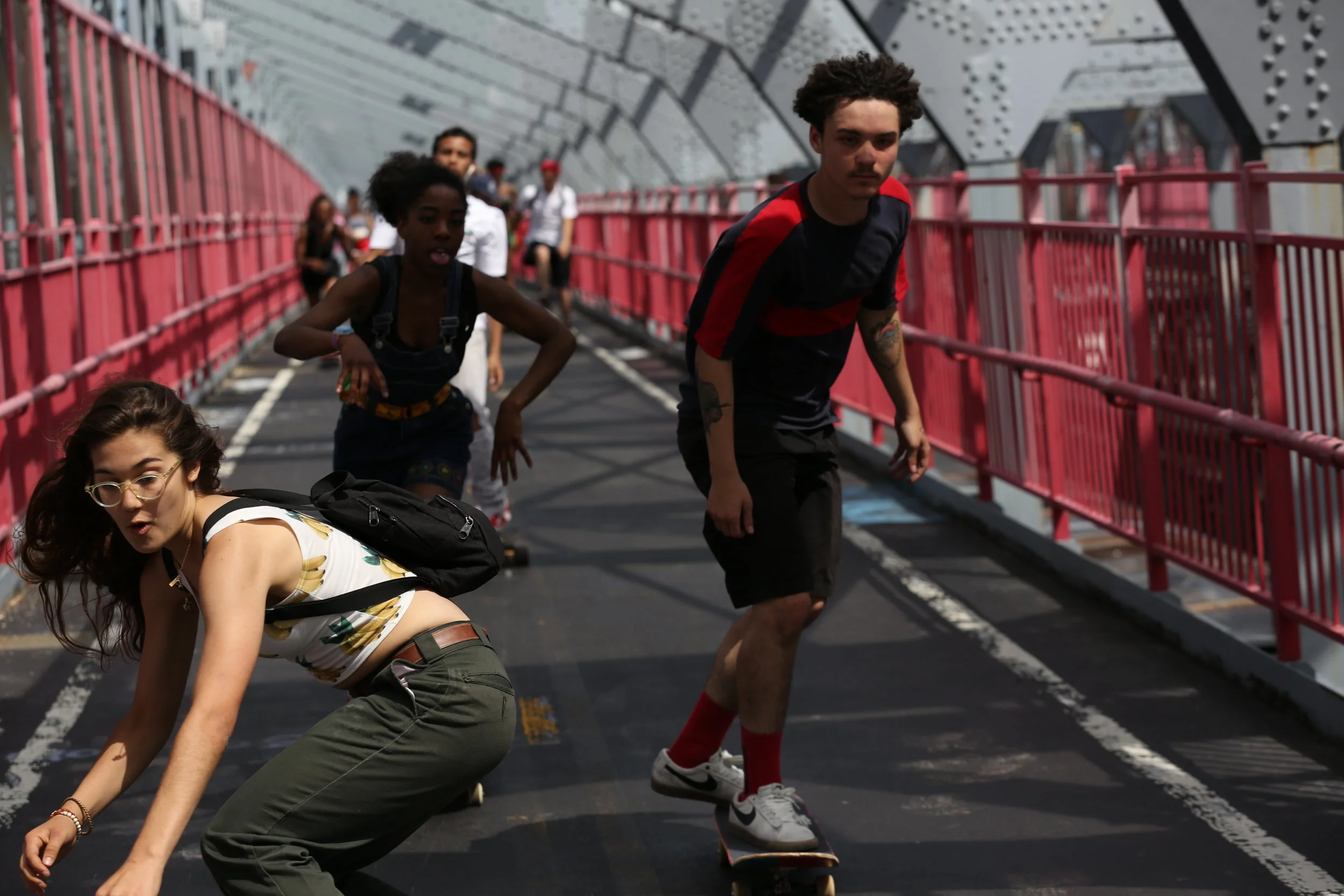Skate Kitchen: An actual crew of young women boarders becomes less real as fiction
By Liam Lacey
Rating: B
In 2015, filmmaker Crystal Moselle released the documentary The Wolfpack, a freakishly strange account of a family of six boys and their sister who were confined in a Lower East Side high-rise by their father, where they were homeschooled and immersed in movie culture.
For her follow-up, Skate Kitchen - which premiered at this year’s Sundance film festival - Moselle focuses on another New York enclave, a crew of young women skateboarders called Skate Kitchen.
Rather than do a documentary, Moselle chose to give their story a dramatic fictional treatment, changing names and providing a story about family and emerging sexuality and about flying through the Manhattan streets on wheeled boards.
Dede Lovelace hangs with Jaden Smith, who's a member of a rival crew in Skate Kitchen
The central figure is Camille (Rachelle Vinberg), a regal eighteen-year old with long hair and oversized pale-framed glasses, who is cast as an outsider, a girl from Long Island who lives with her mother (Elizabeth Rodriguez).
After Camille gets “credit carded” (a painful crotch injury by landing on the edge of the board), her mother insists she give up this dangerous-to-her-femininity sport. But Camille persists, taking the train into Manhattan where she meets up with other girls she has followed on social media.
The Manhattan crew are led by the scrappy alpha dudette, Kurt (Nina Moran), though Camille becomes close to Janay (Dede Lovelace), and her warmly accepting family.
Eventually, Camille leaves home to live with Janay, finds a store clerk job, and starts to spend time with a stock boy, Devon (Jaden Smith, son of Will Smith). Devon’s an amateur photographer and part of a crew of male skaters who the Skate Kitchen crew know and with whom they sometimes have run-ins. In the film’s key dramatic turn - which feels like a predicament from a Young Adult novel - Camille is ostracized by the other girls for a perceived betrayal.
Like other skateboard movies, Skate Kitchen is about marginalized youth exploring courage, grace, collegiality and freedom in their low-cost sport. Gus Van Sant’s Paranoid Park (2007) set the standard for fiction. Another skateboard film from this year’s Sundance festival, Bing Liu’s prize-winning documentary Minding the Gap (shot over 12 years in his depressed Illinois home town), may be the genre’s best example to date.
Skate Kitchen follows that template with a feminist orientation and its achievement is the fact that it exists at all. After all, how many other female skateboarder movies are there? As expected, it celebrates women’s courage and athleticism, but also offers a lot of observant girl-group hang time, scenes with life discussions (including a long discussion about tampons) and partying.
The film has a kinship with the 2014 French film, Girlhood, though without the latter’s emphasis on race and class. The New York girls’ freedom is circumscribed by parental disapproval and the need for money, but also by the pressure of male sexual aggression, which ranges from annoyingly crude to dangerous (in one instance, the Skate Kitchen team rallies to protect one of their friends after she’s slipped a knock-out drug).
As fresh as the female perspective is, as Skate Kitchen circles and swoops through the Manhattan twilight toward its conclusion, there is a sense of missed potential, that the film could have been much richer than it is. We learn almost nothing about the socio-economic backgrounds or aspirations of the other skaters in the crew (all apparently poor girls living with bold style in a rich city). There must be better stories to tell here, and they might have been better told by digging deeper into reality via the documentary form.
Skate Kitchen. Directed by Crystal Moselle. Written by Aslihan Unaldi, Crystal Moselle, Jennifer Silverman. Starring: Rachelle Vinberg, Dede Lovelace, Jaden Smith, Nina Moran, Ajani Russell and Kabrina Adams. Skate Kitchen shows at the TIFF Bell Lightbox, and will open in Montreal and Vancouver on August.

